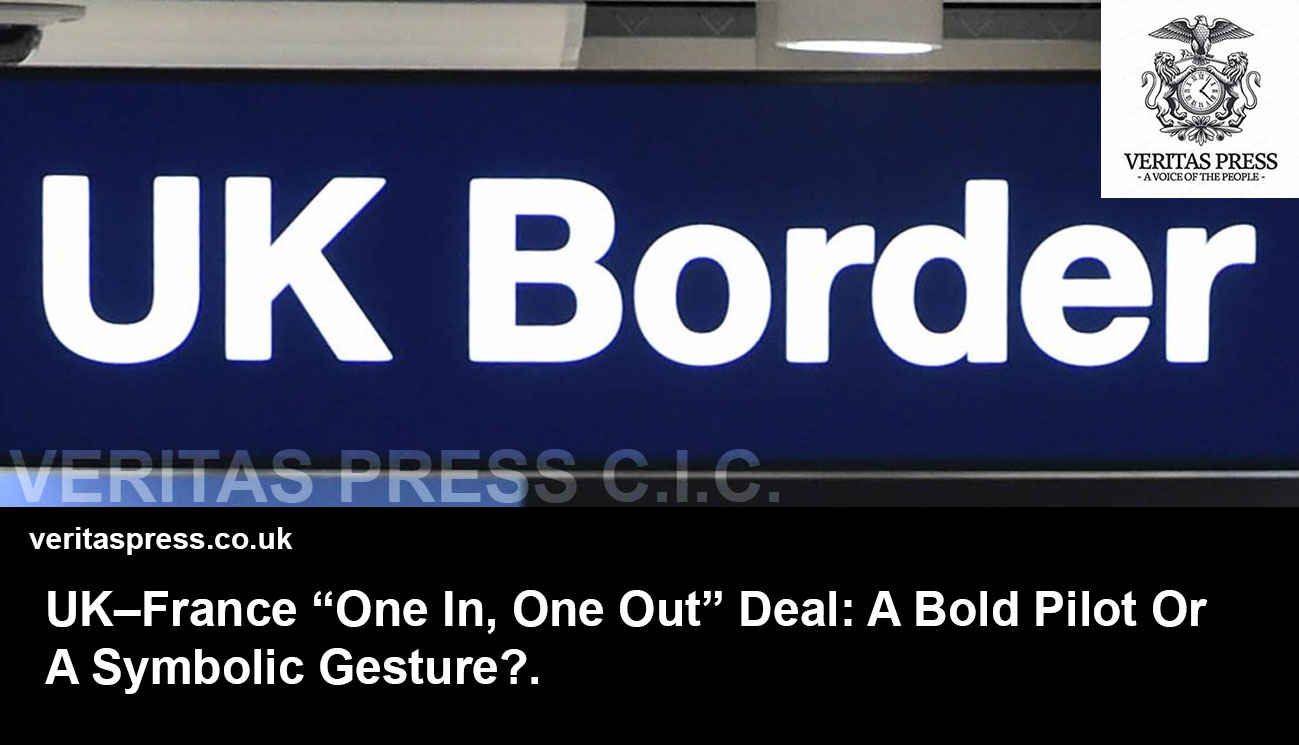Press Release: Veritas Press C.I.C.
Author: Kamran Faqir
Article Date Published: 05 Aug 2025 at 15:40 GMT
Category: UK-France | Politics | Immigration
Source(s): Veritas Press C.I.C. | Multi News Agencies
Paris/London, August 5, 2025 – The UK–France “one‑in, one‑out” migrant return treaty was officially launched today. Under the pilot, expected to run through June 2026, Britain may return roughly 50 adult migrants per week, deemed ineligible after arriving via small boats, to France in exchange for around 50 vetted asylum seekers with family ties in the UK, pre-screened from French soil.
Home Office & The Government Position:
Home Secretary Yvette Cooper described the deal as a historic breakthrough that “undermines organised criminal gangs” and “signals firmly that illegal crossings will not go unchallenged.” She emphasised that the government has taken operational steps, including expanding detention capacity and implementing new protocols for inadmissible claims. However, she declined to set weekly return targets beyond the initial 50-person estimate, citing concerns that publicly releasing figures could help smugglers.
A Home Office statement also noted plans for £100 million in new investment targeting smuggling networks, funding enforcement, technology, and French cooperation, including 300 additional officers and new surveillance tools.
Expert & Civil Society Critiques:
Legal and migration analysts express deep scepticism. Dr Peter Walsh of Oxford’s Migration Observatory warns that unless 80–85% of crossings are prevented, smuggling networks remain profitable: “It’s like whack‑a‑mole: crack one gang and another springs up”.
The Guardian’s editorial board echoed this, calling the scheme morally significant but questioning its efficiency given its small scale, and urging expansion of safe legal routes to counter smugglers’ business model.
Meanwhile, refugee rights groups like Safe Passage International argue that the deal may push desperate people into riskier routes: “Hostile security measures push migrants into the hands of smugglers,” says CEO Dr Wanda Wyporska, warning vulnerable individuals will take even more perilous journeys. A spokesperson for Care4Calais confirmed the charity is considering legal action, noting its prior successful challenges to Channel pushbacks and the Rwanda policy.
Political Opposition & Public Reaction:
Conservative MPs, including Shadow Home Secretary Chris Philp, dismiss the scheme as ineffectual: “Returning just 50 a week is a gimmick” and covers only a pinch of the up to 800 weekly crossings. Former Immigration Minister Robert Jenrick urged tougher action, advocating reinstatement of a Rwanda-style deportation policy and further ECHR reforms.
Behind the scenes, public opinion is inflamed: as of July, over 25,000 migrants had crossed the Channel in 2025, a 51 % rise from a year earlier, with single-day totals near 900 arrivals using small boats. A YouGov poll reported by The Guardian shows many Britons overestimate illegal immigration, feeding support for hard-line measures like mass deportation schemes.
Operational Capacity & Institutional Preparedness:
Critics point to systemic weaknesses within the Home Office. A 2022 independent inspection found processing poor, biometrics missing, and Border Force overstretched, despite subsequent reforms.
Moreover, Border Force vessel procurement delays forced multi-million‑pound upkeep of older patrol boats, stretching maritime enforcement capabilities in the Channel.
On-The-Ground Concerns:
Across Kent towns and migrant reception centres, local leaders express frustration. Civil unrest has flared as asylum seeker housing is designated in hotels and community facilities, prompting protests and demands for more humane and organised asylum pathways. Locals describe a sense of being “left out of planning” and overwhelmed by costs and strain on housing.
Moving Forward: Is The Deal Enough?
Government View:
- A symbolic victory in deeper Franco-British cooperation.
- A diplomatic contrast to the previous Rwanda deportation policy.
- Emphasis on disrupting smuggler finances via enforcement and online crackdown measures, including new criminal penalties for promoting smuggling online (up to five years’ jail).
- Fast-track asylum reforms promised to reduce the backlog and speed up removals and decisions.
Critics’ Verdict:
- Exchange of 50 weekly cases is a drop in a rapidly rising stream, 25,000-plus crossings already in 2025.
- Long return queues and legal challenges may slow removal further.
- Risk that abuse of family‑link criteria could be exploited via fraud or consultants, as critics argue.
- Humanitarian concerns remain: critics say lives lost at sea continue while safe routes remain constrained.
- Unless the deal scales substantially and is paired with an expanded legal access route, experts worry smugglers will adjust tactics, and crossings could continue to rise.
In Summary: A Deal Of Optics Over Outcomes?
While the UK–France “one-in, one-out” agreement is being heralded by officials as a historic step toward tackling irregular migration, its foundations rest on deeply fragile assumptions, both legal and logistical. The numbers proposed are minuscule compared to the scale of the crisis. With 25,000 arrivals this year alone and only an estimated 50 returns per week, the pilot amounts to little more than a symbolic gesture repackaged as reform.
Experts warn that the scheme is unlikely to dismantle the lucrative smuggling trade, which thrives on desperation and the absence of safe legal alternatives. “If the government wants to stop small boats, it must give people a safer route,” said Steve Valdez-Symonds of Amnesty International UK. “Otherwise, all they’ve done is rebrand deterrence as diplomacy.”
The deal also shifts humanitarian responsibility onto France without addressing root causes. Crucially, Britain’s exit from the EU and the loss of the Dublin III mechanism have stripped it of previous legal tools to return migrants to EU countries, now replaced by ad hoc arrangements that appear legally vulnerable and politically volatile. Even government insiders admit the treaty walks a fine line, and refugee groups are already preparing legal challenges that could stall or derail the scheme entirely.
If anything, the deal underscores the UK’s ongoing policy vacuum on asylum and immigration, reactive rather than strategic, focused more on headline management than structural change. A government confident in its long-term vision for migration wouldn’t rely on bilateral swaps or ambiguous pilot schemes. It would expand safe routes, tackle application backlogs, invest in integration, and treat migration as a permanent global reality, not a seasonal threat to be outsourced and suppressed.
Instead, this agreement may well serve as a temporary political bandage, crafted for optics, constrained by scale, and ultimately brittle under scrutiny. Whether the pilot leads to long-term reform or quietly collapses under its own contradictions remains to be seen. What is clear, however, is that human beings are once again being traded in numbers while the deeper questions of justice, obligation, and international protection remain unaddressed.
Tags:




























Leave a Reply